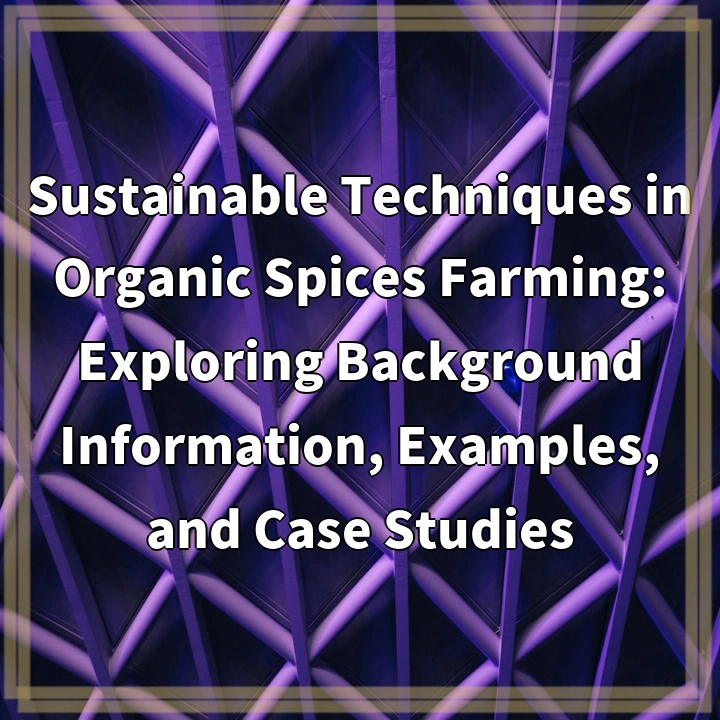
What is Sustainable Techniques in Organic Spices Farming?
Organic spices farming refers to the cultivation of spices without the use of synthetic pesticides, herbicides, or genetically modified organisms (GMOs). It focuses on maintaining the health of the soil, conserving water resources, and promoting biodiversity. Sustainable techniques in organic spices farming go beyond the absence of chemicals and aim to create a holistic and environmentally friendly approach to spice cultivation.
Real-World Problems Associated with Sustainable Techniques in Organic Spices Farming
While the adoption of sustainable techniques in organic spices farming has numerous benefits, various challenges and issues need careful consideration:
1. Pest and Disease Control: Organic farming relies on natural and organic methods for pest and disease control. This can be a challenge as it may require a more proactive and labor-intensive approach, such as crop rotation, companion planting, and the use of biopesticides.
2. Yield and Productivity: Organic spices farming may experience lower yields compared to conventional farming due to pest and weed pressures. This can affect the economic viability of farms and pose challenges in meeting the growing demand for organic spices.
3. Knowledge and Skills Gap: Transitioning to sustainable techniques requires knowledge and expertise in organic farming practices. Farmers may need training and support to adopt and implement these techniques effectively.
4. Market Demand: While the demand for organic spices is increasing, access to reliable and conducive markets can be a hurdle. Farmers may need assistance to access organic certification, develop value-added products, and connect with potential buyers.
5. Climate Change Impacts: Climate change can affect spice cultivation, including the flowering, fruiting, and overall growth of the spice plants. Changes in temperature, rainfall patterns, and extreme weather events can impact crop yield and quality.
These real-world problems highlight the importance of ongoing research, farmer education, policy support, and market development to address the challenges and promote the adoption of sustainable techniques in organic spices farming. By finding innovative solutions and fostering collaboration between farmers, researchers, and consumers, we can strive towards a more sustainable and responsible approach to spice production.

Solutions for Sustainable Techniques in Organic Spices Farming
Addressing the real-world problems associated with sustainable techniques in organic spices farming requires a multi-faceted approach. Here are some solutions that can help overcome these challenges:
1. Integrated Pest Management:
Implementing integrated pest management (IPM) techniques can minimize pest and disease pressures. This involves a combination of cultural practices, biological control methods, and targeted use of organic pesticides when necessary. Regular monitoring of crops and the use of pest-resistant varieties can also be beneficial.
2. Soil Health Improvement:
Prioritize soil health by using organic matter, compost, and cover crops to enhance soil fertility and structure. Crop rotation, intercropping, and agroforestry systems can help break pest and disease cycles and improve overall soil health. Applying proper irrigation techniques and water conservation practices can further enhance sustainability.
3. Knowledge Sharing and Education:
Promote farmer training programs, workshops, and extension services to improve knowledge and skills in organic spices farming. Providing resources, guidelines, and access to technical expertise can empower farmers to effectively implement sustainable techniques and address challenges they may encounter.
4. Market Development and Certification:
Support organic certification initiatives and assist farmers in meeting the requirements. Establishing strong market linkages, both locally and globally, can help create a demand for organic spices. Encouraging fair trade practices and promoting consumer awareness of the benefits of organic products can also contribute to market development.
5. Climate Resilience Strategies:
Develop and promote climate-smart practices to mitigate the impacts of climate change on spice cultivation. This includes using climate-resilient crop varieties, adopting precision agriculture technologies, and implementing water-efficient irrigation systems. Encouraging diversification of farm enterprises can also help farmers adapt to changing climatic conditions.
By embracing these solutions and working collaboratively, farmers, researchers, policymakers, and consumers can support the adoption of sustainable techniques in organic spices farming. This will not only contribute to the preservation of the environment but also ensure the availability of high-quality, sustainably grown spices for future generations.















